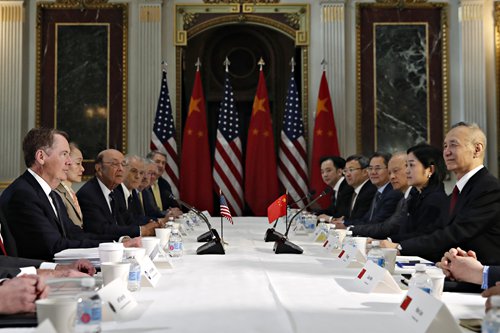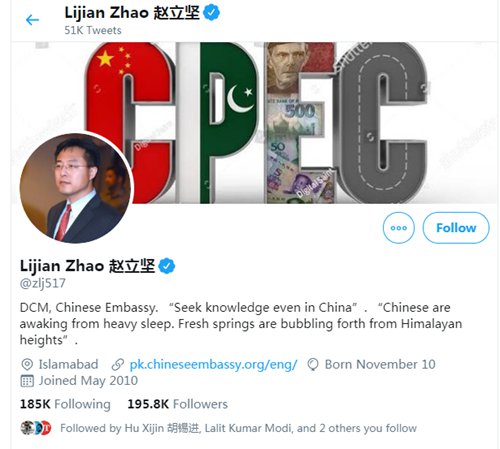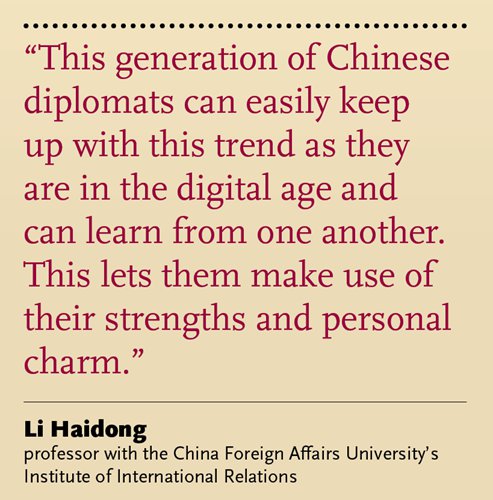HOME >> CHINA
Chinese diplomats on social media an inevitable trend
By Shan Jie Source:Global Times Published: 2019/7/30 17:58:43
Chinese diplomats on social media an inevitable trend, showcases confidence and openness: experts
○ Chinese diplomats abroad are using Twitter to speak for and defend their country
○ Young generations are more open and more likely to follow this trend
○ Diplomats speaking on Twitter has made the Western world, which holds China to double standards, uncomfortable, experts said

Twitter has become a new battlefield for Chinese diplomats.
Zhao Lijian, minister counselor of the Chinese Embassy in Pakistan, drew global attention earlier this month after he became embroiled in a fierce verbal battle with former US national security adviser Susan Rice on Twitter.
Zhao has been using Twitter to present China's viewpoints and defend the country.
On Monday, he slapped Zaid Hamid, a Pakistani political commentator, for criticizing China's policy on religions in Northwest China's Xinjiang Uyghur Autonomous Region.
"A person who doesn't know ABC about China. Do some homework before you write about my country," Zhao wrote while retweeting a post from Hamid.
Zhao's reply was echoed by Twitter users, garnering more than 4,500 likes in one day.
"He is nobody. We are fed up with him as well," Samia Toor wrote.
Within 24 hours, Zhao posted more than 10 tweets, including replies to Hamid and posts highlighting the achievements of the China-Pakistan Economic Corridor (CPEC).
Zhao joined Twitter in May 2010.
He has more than 195,000 followers and he follows more than 185,000 accounts on the social platform.

"This is a big change," Li Haidong, a professor with the China Foreign Affairs University's Institute of International Relations, told the Global Times on Thursday.
"It used to be government-to-government talk, but now it's more direct."
"It's a new way to work, showing new ideas and keeping up with the times," Li said, noting that when talks at government level are not going well, it should not be surprising to see officials reach out directly to the people.
Considering current China-US trade friction, China needs people and local governments in the US to understand its stance on issues so they in turn can influence the US federal government and keep China-US relations on the right track, Li said.
Jin Canrong, associate dean of Renmin University of China's School of International Studies, told the Global Times that China has developed considerably in national power and will not hide its power. Jin noted that Chinese people's mindset has changed.
"Nowadays China has more interests. If we do not protect [those interests], who will?" Jin said. "Also, the international community is asking China to shoulder more responsibility."
Jin noted that since the 18th Communist Party of China National Congress in late 2012, in general, China's diplomacy has become more positive and progressive, resulting in Chinese diplomats becoming more confident and active.
"Since the overall strategy has become more relaxed, tactics have done so as well," Jin said, noting that China's Foreign Ministry spokespersons, such as Lu Kang and Hua Chunying, "are more humorous than their predecessors."
The pioneers
Zhao is the most active Chinese diplomat on Twitter and has the most followers.
However, a few who have joined after Zhao have also caught the attention of Western media.
One of them, Chinese Ambassador to the US Cui Tiankai, posted his first tweet on July 8.
He gained more than 13,700 followers within three weeks. He followed three accounts - the Office of the US Trade Representative, US Treasury Secretary Steven Mnuchin and Graham Allison, the author of Destined for War: Can America and China Escape Thucydides Trap?
He has posted eight tweets. One remarking "#Taiwan is part of #China. No attempts to split China will ever succeed" has been retweeted 2,900 times and has received 2,100 likes.

Wei Qiang, the Chinese Ambassador to Panama, joined Twitter in October 2017 and posts in Spanish. The two countries forged diplomatic ties in June 2017.
Chinese Ambassador to Maldives Zhang Lizhong is another Chinese diplomat active on Twitter. "Posted abroad first in San Francisco, later in Kolkata and NOW in Male," he wrote on his profile.
Jin said that older Chinese diplomats give an impression of cautiousness, going on to note that they are not very familiar with the workings of social media.
"But the new generation of diplomats is more used to social media, and they show more personal characteristics. When they are talking to Westerners or Western media, they seem more flexible and skilled."
"China is more modernized and confident than before, so there are going to be more of these new conversations," Jin said.
Current diplomacy is closely connected to this trend. "This generation of Chinese diplomats can easily keep up with this trend as they are in the digital age and can learn from one another," Li said.
Li said he believes that China's diplomatic policy is giving the country's ambassadors and diplomats more room to maneuver when it comes to communicating with people in the country they are in.
"This lets them make good use of their strengths and personal charm."
Following the trend
But do Chinese diplomats have courses or handbooks to help them handle media?
Jin said that he feels there shouldn't be a handbook. "It should be based on a diplomat's experience."
"Each country has strict demands and specifications for foreign diplomats, including the US," he said. "There should be some training, but not that frequent."
He said that young Chinese diplomats are more open than their predecessors, therefore, those with personality will standout.
"Actually, the boundaries in diplomacy is tested by the diplomats and are not regulated," he explained. "It is a process… by being more understanding about diplomats, Chinese diplomacy can be more flexible and proactive."

He said he believes that the Twitter accounts of the Chinese diplomats were approved by upper administration departments.
He also noted that in the past, Chinese ambassadors and officials abroad would also present their voices a lot at events or during interviews.
"They have been doing this for a while now. Twitter is just a brand new platform," He said.
Double standards
Chinese diplomats' confidence on Twitter has caught the attention of Western media.
"Chinese diplomats abroad, not traditionally known for being outspoken, have started to use the platform to confront Beijing's critics more directly and aggressively," said the Guardian on July 17 in a report titled "China's envoys try out Trump-style Twitter diplomacy."
Li said that this communication on social media highlights the differences between Chinese and Western elites when it comes to discourse, ways of thinking and points of view on certain issues and shows Western media's biases on issues including Xinjiang, religion and human rights.
Chinese diplomats should say what they are truly thinking, but also consider the feelings of the public, he noted.
Li said that Chinese diplomats taking advantage of social media platforms to communicate with people in other countries is inevitable, "especially when the governments in some countries have become crazy and have an unhealthy psychology."
The diplomats should not just repeat statements from the Chinese Foreign Ministry, as this is not enough for them to refute these biases and false opinions. Instead, they should use their own experience to win people over.
Jin said that the West has seemed "uncomfortable" about this change.
"When China does not talk in the international community, the West blames China; but when China talks, the West cannot stand it," Jin said. "They are inconsistent. So their attitude does not matter."
Jin said that sometimes, when the Western world criticizes China, they call it "freedom of speech;" but when China speaks back, it is called suppressing freedom. "'Freedom' has become their patent. This is an 'autocratic liberalism.'"
That is why they often say "Shut up. We are discussing freedom."

Newspaper headline: Taking on Twitter
○ Young generations are more open and more likely to follow this trend
○ Diplomats speaking on Twitter has made the Western world, which holds China to double standards, uncomfortable, experts said

Chinese Vice Premier Liu He (front right) attends trade negotiations between senior Chinese and US officials on February 21 in Washington. Photo: VCG
Twitter has become a new battlefield for Chinese diplomats.
Zhao Lijian, minister counselor of the Chinese Embassy in Pakistan, drew global attention earlier this month after he became embroiled in a fierce verbal battle with former US national security adviser Susan Rice on Twitter.
Zhao has been using Twitter to present China's viewpoints and defend the country.
On Monday, he slapped Zaid Hamid, a Pakistani political commentator, for criticizing China's policy on religions in Northwest China's Xinjiang Uyghur Autonomous Region.
"A person who doesn't know ABC about China. Do some homework before you write about my country," Zhao wrote while retweeting a post from Hamid.
Zhao's reply was echoed by Twitter users, garnering more than 4,500 likes in one day.
"He is nobody. We are fed up with him as well," Samia Toor wrote.
Within 24 hours, Zhao posted more than 10 tweets, including replies to Hamid and posts highlighting the achievements of the China-Pakistan Economic Corridor (CPEC).
Zhao joined Twitter in May 2010.
He has more than 195,000 followers and he follows more than 185,000 accounts on the social platform.

Screenshot of the Twitter profile of Zhao Lijian, minister counselor of the Chinese Embassy in Pakistan
Apart from Zhao, several other Chinese ambassadors and senior diplomats are also taking to Twitter to express their opinions and represent China's stance on major issues."This is a big change," Li Haidong, a professor with the China Foreign Affairs University's Institute of International Relations, told the Global Times on Thursday.
"It used to be government-to-government talk, but now it's more direct."
"It's a new way to work, showing new ideas and keeping up with the times," Li said, noting that when talks at government level are not going well, it should not be surprising to see officials reach out directly to the people.
Considering current China-US trade friction, China needs people and local governments in the US to understand its stance on issues so they in turn can influence the US federal government and keep China-US relations on the right track, Li said.
Jin Canrong, associate dean of Renmin University of China's School of International Studies, told the Global Times that China has developed considerably in national power and will not hide its power. Jin noted that Chinese people's mindset has changed.
"Nowadays China has more interests. If we do not protect [those interests], who will?" Jin said. "Also, the international community is asking China to shoulder more responsibility."
Jin noted that since the 18th Communist Party of China National Congress in late 2012, in general, China's diplomacy has become more positive and progressive, resulting in Chinese diplomats becoming more confident and active.
"Since the overall strategy has become more relaxed, tactics have done so as well," Jin said, noting that China's Foreign Ministry spokespersons, such as Lu Kang and Hua Chunying, "are more humorous than their predecessors."
The pioneers
Zhao is the most active Chinese diplomat on Twitter and has the most followers.
However, a few who have joined after Zhao have also caught the attention of Western media.
One of them, Chinese Ambassador to the US Cui Tiankai, posted his first tweet on July 8.
He gained more than 13,700 followers within three weeks. He followed three accounts - the Office of the US Trade Representative, US Treasury Secretary Steven Mnuchin and Graham Allison, the author of Destined for War: Can America and China Escape Thucydides Trap?
He has posted eight tweets. One remarking "#Taiwan is part of #China. No attempts to split China will ever succeed" has been retweeted 2,900 times and has received 2,100 likes.

Screenshot of the Twitter profile of Cui Tiankai, Chinese ambassador to the US
Chinese Ambassador to India Sun Weidong joined Twitter on December 2017. He often posts on China's development and China-India relations.Wei Qiang, the Chinese Ambassador to Panama, joined Twitter in October 2017 and posts in Spanish. The two countries forged diplomatic ties in June 2017.
Chinese Ambassador to Maldives Zhang Lizhong is another Chinese diplomat active on Twitter. "Posted abroad first in San Francisco, later in Kolkata and NOW in Male," he wrote on his profile.
Jin said that older Chinese diplomats give an impression of cautiousness, going on to note that they are not very familiar with the workings of social media.
"But the new generation of diplomats is more used to social media, and they show more personal characteristics. When they are talking to Westerners or Western media, they seem more flexible and skilled."
"China is more modernized and confident than before, so there are going to be more of these new conversations," Jin said.
Current diplomacy is closely connected to this trend. "This generation of Chinese diplomats can easily keep up with this trend as they are in the digital age and can learn from one another," Li said.
Li said he believes that China's diplomatic policy is giving the country's ambassadors and diplomats more room to maneuver when it comes to communicating with people in the country they are in.
"This lets them make good use of their strengths and personal charm."
Following the trend
But do Chinese diplomats have courses or handbooks to help them handle media?
Jin said that he feels there shouldn't be a handbook. "It should be based on a diplomat's experience."
"Each country has strict demands and specifications for foreign diplomats, including the US," he said. "There should be some training, but not that frequent."
He said that young Chinese diplomats are more open than their predecessors, therefore, those with personality will standout.
"Actually, the boundaries in diplomacy is tested by the diplomats and are not regulated," he explained. "It is a process… by being more understanding about diplomats, Chinese diplomacy can be more flexible and proactive."

The Chinese Foreign Ministry holds an open attitude toward Twitter, He Weiwen, a former economic and commercial counselor at Chinese consulates in San Francisco and New York, told the Global Times.
He said he believes that the Twitter accounts of the Chinese diplomats were approved by upper administration departments.
He also noted that in the past, Chinese ambassadors and officials abroad would also present their voices a lot at events or during interviews.
"They have been doing this for a while now. Twitter is just a brand new platform," He said.
Double standards
Chinese diplomats' confidence on Twitter has caught the attention of Western media.
"Chinese diplomats abroad, not traditionally known for being outspoken, have started to use the platform to confront Beijing's critics more directly and aggressively," said the Guardian on July 17 in a report titled "China's envoys try out Trump-style Twitter diplomacy."
Li said that this communication on social media highlights the differences between Chinese and Western elites when it comes to discourse, ways of thinking and points of view on certain issues and shows Western media's biases on issues including Xinjiang, religion and human rights.
Chinese diplomats should say what they are truly thinking, but also consider the feelings of the public, he noted.
Li said that Chinese diplomats taking advantage of social media platforms to communicate with people in other countries is inevitable, "especially when the governments in some countries have become crazy and have an unhealthy psychology."
The diplomats should not just repeat statements from the Chinese Foreign Ministry, as this is not enough for them to refute these biases and false opinions. Instead, they should use their own experience to win people over.
Jin said that the West has seemed "uncomfortable" about this change.
"When China does not talk in the international community, the West blames China; but when China talks, the West cannot stand it," Jin said. "They are inconsistent. So their attitude does not matter."
Jin said that sometimes, when the Western world criticizes China, they call it "freedom of speech;" but when China speaks back, it is called suppressing freedom. "'Freedom' has become their patent. This is an 'autocratic liberalism.'"
That is why they often say "Shut up. We are discussing freedom."

Newspaper headline: Taking on Twitter